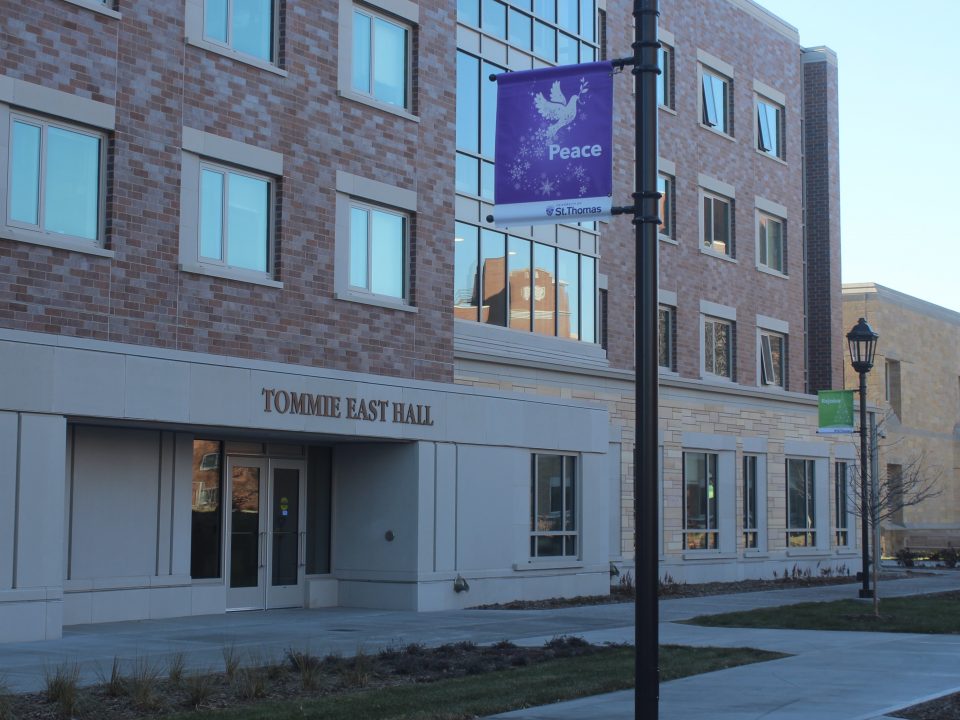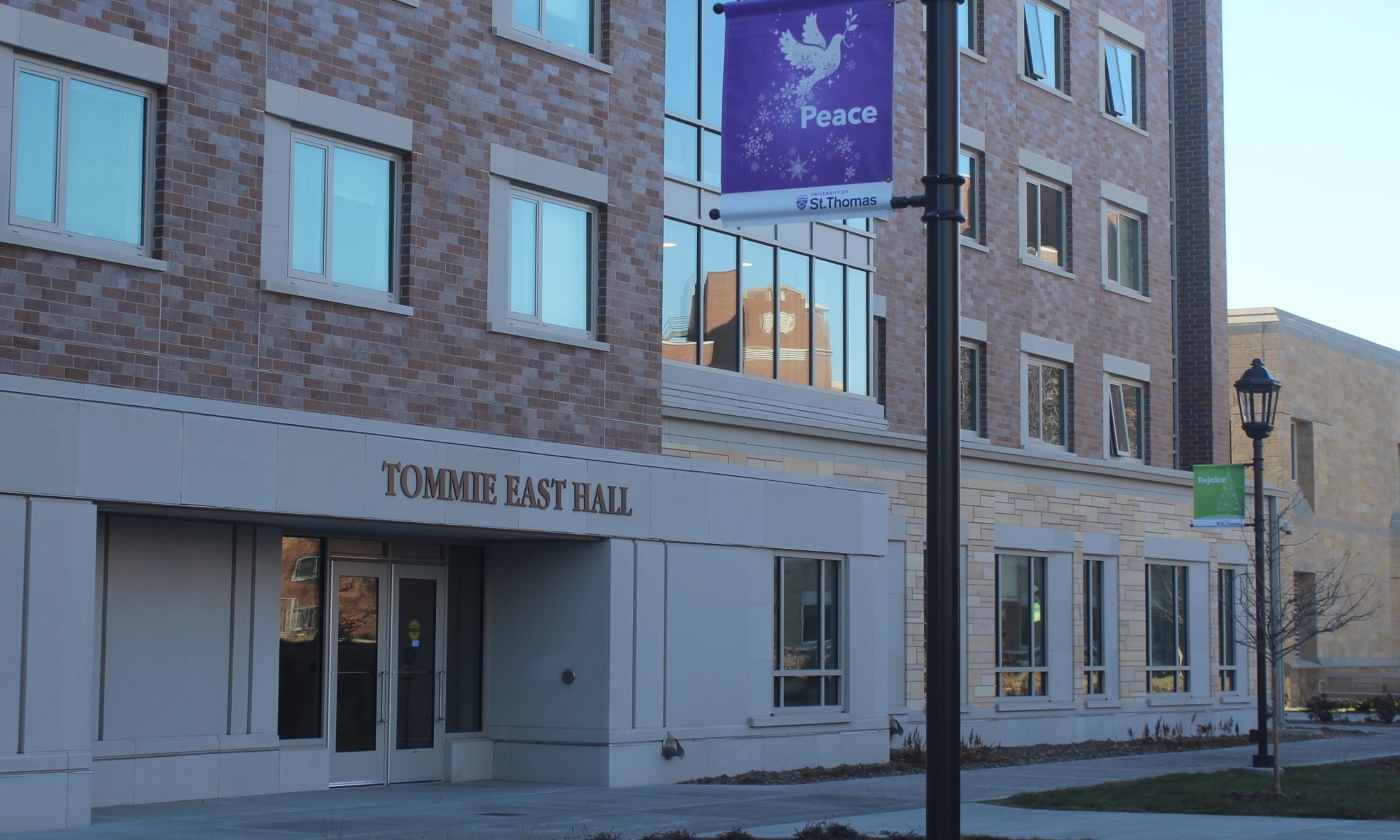
Tommie East Hall will be renamed Frey Hall after donors Mary and Gene Frey. President Sullivan discussed the renaming, along with other university affairs, at the State of the University address on Tuesday, Feb. 15. (Kyra Taylor/TommieMedia)
St. Thomas President Julie Sullivan announced the renaming of the Tommie East residence hall on campus to Frey Hall in a virtual State of the University address Tuesday.
Sullivan also discussed details regarding the university’s response to the COVID-19 pandemic, statements about finances and steps to continue delivering on the 2025 Strategic Plan.
Robust residency requirement
Vice President of Student Affairs Karen Lange addressed the new living requirement, which requires first-year and sophomore students to live on campus.
“There are tremendous rewards to a residential liberal arts experience,” Lange said. “It creates opportunities for meaningful connections for students with each other.”
Sullivan discussed how donations have played a big role in this new requirement,ensuring students’ access to this experience.
In particular, a gift of $15 million from donor Gene Frey will help “to provide room and board grants for first- and second-year students in financial need,” Sullivan said.
“These grants allow so many more students to experience the robust benefit of the on campus residential experience,” Sullivan said.
With this donation, the university decided to rename Tommie East to Mary and Gene Frey Hall; a celebration of this donation will occur in early May.
“It is a transformational gift,” Sullivan said. “We’re deeply grateful to the Frey family for their commitment to St. Thomas.”
Addressing financial concerns with student enrollment
Sullivan addressed the projected total for both undergraduate and graduate net tuition revenue, which is $10 million less than it was in 2018 and 2019.
“The steady decline over the past three years is partially due to the pandemic, but it’s also due to changing student behavior, changing student interests and also changing financial and student capacity,” Sullivan said.
Sullivan cited lower enrollment numbers as contributing to this short revenue.
“This projected shortfall started with the lower number of first-time first-year undergraduate students as well as graduate students,” Sullivan said. “Our updated projects show that our J-Term and spring enrollments also are down further below budget than we anticipated last fall.”
Sullivan assured employees that “there will not be mass layoffs or furloughs or cuts to compensation or to benefits.”
The 2025 Strategic Plan is “expected to contribute and grow future enrollment” by helping to alleviate financial concerns and focusing on current strategic priorities such as the School of Nursing and the Schoenecker Center, Sullivan said.
These priorities are primarily funded by “philanthropy and quasi-endowment funds” from donors.
“Our donors are increasingly investing in our priorities,” Sullivan said. “Just this academic year – so since July 1, 2021 – we have raised over $65 million towards our fundraising goal of $90 million for this year.”
Sullivan highlighted that funding is on track to exceed fundraising production in any previous year in the history of St. Thomas.
“This money is funding scholarships and many other important priorities,” Sullivan said.
The Schoenecker Center
Executive Vice President and Provost Eddy Rojas described how the opening of the Schoenecker Center will help foster collaboration between students and faculty.
“Our themes of innovating and creating interdisciplinary experiences will help our students become well rounded leaders of the future,” Rojas said.
Rojas shared his excitement for the building and highlighted the interior of the building.
“It will house a 21st century media lab, musical rehearsal spaces, an engineering lab, a Playful Learning Lab, an art gallery and much more,” Rojas said.
Schoenecker Center construction will start early May 2022 and doors will open for students in spring 2024.
New nursing program
Morrison Family College of Health Dean MayKao Hang discussed the new nursing program and described how the college of health will contribute to engaging students and the community.
“We are starting a college of health that’s interprofessional and interdisciplinary during a worldwide pandemic and the fault lines of society have shown us that we really need public health,” Hang said.
The nursing programs for both bachelor’s and master’s degrees are ahead of schedule for students arriving in fall 2022.
“We really want to reinvent and re-envision what nursing looks like to really serve communities that don’t have access to devise ways of having clinical partnerships in the community with non health entities,” Hang said.
Hang hopes to have at least 30% of the inaugural nursing class be students from “rural, historically excluded and underrepresented communities.”
Hang discussed the work the Morrison Family College of Health is doing outside of the nursing program, including having an undergraduate public health major and relaunching the Mental Health and Addiction Program in graduate professional psychology.
Leaning into the Catholic mission
Vice President for Mission the Rev. Chris Collins talked about the strategic plan as an articulation of continuing the vision Archbishop Ireland established and the living out of “our mission as a Catholic university.”
Collins outlined the achievements of the Center for the Common Good.
“The focus this year for the Center for the Common Good is to volunteer, advocacy work surrounding food insecurity, housing justice, the education opportunity gap, climate change and racial justice,” Collins said.
Sustainability is a central facet of the university’s mission to advance the common good, Collins emphasized.
“As you might know, St. Thomas was one of the first universities to join the Laudato Si’ Action Platform, a new initiative of the Vatican proposed by Pope Francis to engage people around the world in the work of caring for our common home,” Collins said.
One of the university’s sustainability initiatives is the Lead in Energy and Environmental Design certification of both Tommie East and Tommie North this year.
“Our commitment to LEED standards extends to all new buildings over 25,000 square feet,” Collins said. “We’re putting into practice the ideas we teach in the classroom and provide our students with a high quality learning and living environment.”
Fostering belonging and dismantling racism
Collins highlighted how St. Thomas has been selected by the American Association of Colleges and Universities to be a “truth, racial healing and transformation campus center.”
This effort is national, hoping to spur activity on racial equity, healing and justice for students, faculty and staff, Collins said.
An effort to dismantle racism includes recognizing days for reflection.
“St. Thomas recently announced that we will also recognize both Indigenous Peoples Day as well as Juneteenth as official university holidays and observe them as such on the academic calendar,” Collins said.
Natalie Hoepner can be reached at hoep8497@stthomas.edu.



